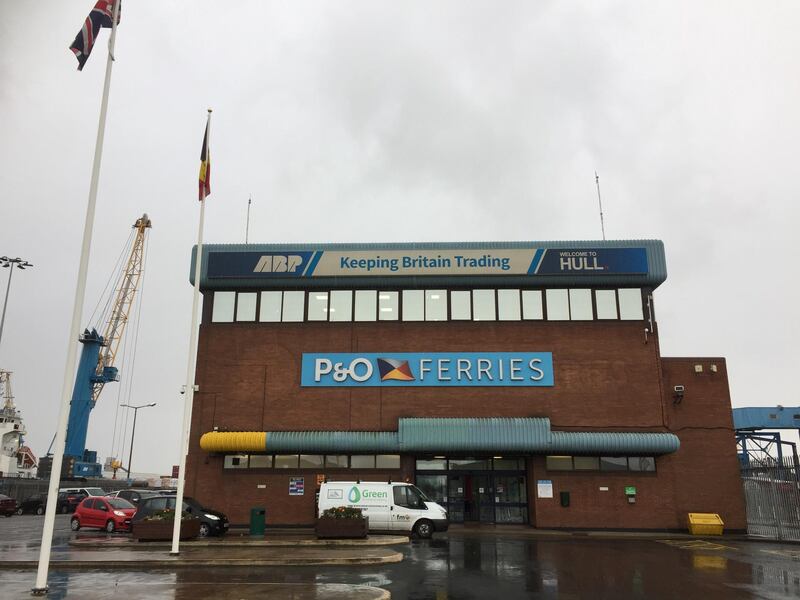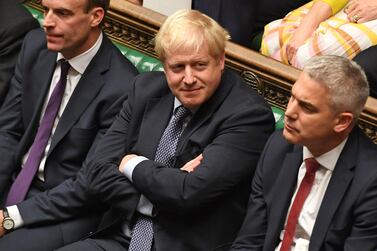With uncertainty still surrounding Brexit, despite a crunch vote on Tuesday, plans are being pushed forward to prepare for a no-deal.
In the event of such a disorderly exit major blockages and delays are expected at the UK’s Channel Tunnel crossing at Dover leaving many businesses no option but to divert their goods to the Yorkshire port of Hull.
Hull is now on course to become one of Britain’s global hub for goods after Brexit.
It is more than four decades since the Cod Wars decimated the fishing industry in the UK’s northern city of Hull.
The city’s proud trawling tradition slipped into decline following the feud over North Sea fishing rights between the UK and Iceland in the 1970s.
Now after years of rising unemployment the key to its revival appears to rest in Brexit.
The UK’s exit from the EU has been causing major headaches for businesses as they try to navigate the uncertainty and changes surrounding it.
But for Hull its waters and ports appear to be Britain’s answer to the nation’s impending logistical nightmare.
Already firms are transferring their goods from heavy goods vehicles (HGV) to containers and shipping them into Hull.
A week ago the UK government signed a £86.6 million freight contract with four ferry companies to ship lifesaving medicines into the country in the event of a no-deal Brexit.
The move will provide capacity for up to 3,000 HGVs to be transported to ports, including Hull, outside of Dover eight times a week.
P&O Ferries in Hull sees hundreds of passengers and freight using its vessels every week – many goods include vital medical supplies.
Presently the queues to enter and exit the terminals are manageable but on the Pride of Bruges ferry drivers are fearful that delays will increase.
Driver Richard Keane said: “We are worried that the checks will cause delays and we are concerned that we will be pushed aside for slots on the ferry ahead of foot passengers.
“I do this trip every week and I and many other drivers are concerned that we will be stuck in long queues.”
P&O has employed a Brexit officer on its ferries to offer advice to customers on the changes to expect after the UK leaves the EU.
Exit times were delayed by up to 30 minutes at both Hull and Zeebrugge ports last week due to immigration checks.
German passenger Monique Haus said: “I do not mind the delay as we are on holiday but it makes you wonder how the UK will manage after Brexit and if these delays will increase. I can only see matters getting worse.”
In the event of no-deal, the government has already forecast that traffic across the Channel could be disrupted for six months, with a reduction in freight capacity of up to 60 per cent.
It comes as the UK’s chief medical officer Dame Sally Davies warned that "patients may die" because of medicine shortages caused by a no-deal Brexit.
Transport Secretary Grant Shapps said: "The UK is getting ready to leave the EU on the 31 October and, like any sensible government, we are preparing for all outcomes.
"Our decisive action means freight operators will be ready and waiting to transport vital medicines into the country from the moment we leave."
The Humber ports are already some of the largest in the country and with the problems expected at the Channel crossing it will be seeing much of the country’s trade diverted through it.
The ports at Immingham and Hull have seen a 30 per cent rise in ship arrivals since the referendum.
It comes as the haulage industry warned that queues of up to 27-kilometres could become common place near Dover.
A snapshot of a worst case scenario came in 2015 when a strike by French ferry works led to long tailbacks along the M20 and cost businesses £250m a day.
In 2018 Dover had just under 2.5 million lorries passing through - the lowest number since 2014.
As a result the fear of the terminal being choked up has led to millions being spent in the Humber on improving container shipments as an alternative to Dover’s roll-on/roll-off method.
Simon Bird, director of the Humber region for Associated British Ports has said: “It is easier to ship a container than process a truck. You pre-clear customs. It is just a click.”
Associated British Ports (ABP) has spent £50m on new technology in the Humber estuary since the referendum.
Justin Atkin from the Port of Antwerp said: “Brexit has made companies re-evaluate their supply chains. We see it as a real opportunity and the Humber is our number one target.
“We’re already seeing a change: cargo is moving to alternative routes. Shippers are looking for something that does not involve a truck. It does not stop the inspection of goods, but it takes out the human element.
“Once you move to unaccompanied vehicles you don’t need the shortest crossing any more. In some cases it may be cheaper as well.”
A study by the University of Hull Logistics Institute has revealed that by switching from Dover to the Humber ports carbon emissions will be cut by a quarter.
A number of retailers, including DIY firm Kingfisher and clothing brand Next, have already diverted their goods from Dover.
One of the UK’s biggest house builders Persimmon recently announced plans to ditch Dover and transport its goods via other areas, and named Hull.
With no swift resolution to the UK's Brexit turmoil in sight, more businesses are expected to follow suit as the country continues to prepare for a worst case scenario.







